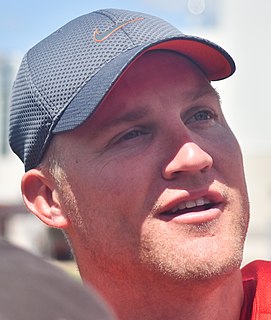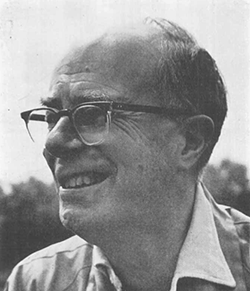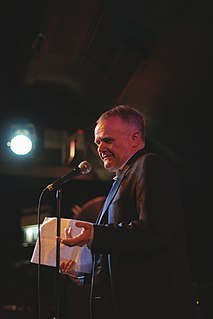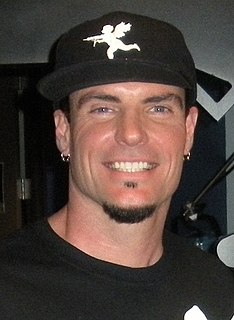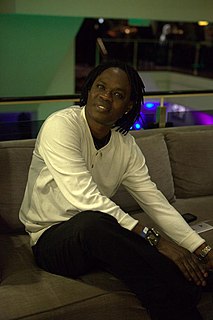A Quote by Shel Silverstein
Birds are flyin' south for winter. Here's the Weird-Bird headin' north, Wings a-flappin', beak a-chatterin', Cold head bobbin' back 'n' forth. He says, "It's not that I like ice Or freezin' winds and snowy ground. It's just sometimes it's kind of nice To be the only bird in town.
Related Quotes
The heart, in its journey to Allah, Majestic is He, is like that of a bird; Love is its head, and fear and hope are its two wings. When the head and two wings are sound, the bird flies gracefully; if the head is severed, the bird dies; if the bird loses one of its wings, it then becomes a target for every hunter or predator.
The snowy owl has eyes that look just like mine, especially when it widens them. And while I stand there, staring at it, lowering my sunglasses, something unspoken passes between me and the bird - there's this weird kind of tension, a bizarre pressure, that fuels the following, which starts, happens, ends, very quickly.
On consideration, it is not surprising that Darwin's finches should recognize their own kind primarily by beak characters. The beak is the only prominent specific distinction, and it features conspicuously both in attacking behaviour, when the birds face each other and grip beaks, and also in courtship, when food is passed from the beak of the male to the beak of the female. Hence though the beak differences are primarily correlated with differences in food, secondarily they serve as specific recognition marks, and the birds have evolved behaviour patterns to this end.
Thirty years ago my older brother, who was ten years old at the time, was trying to get a report written on birds that he'd had three months to write, which was due the next day. We were out at our family cabin in Bolinas, and he was at the kitchen table close to tears, surrounded by binder paper and pencils and unopened books about birds, immobilized by the hugeness of the task ahead. Then my father sat down beside him put his arm around my brother's shoulder, and said, "Bird by bird, buddy. Just take it bird by bird.
A bird maintains itself in the air by imperceptible balancing, when near to the mountains or lofty ocean crags; it does this by means of the curves of the winds which as they strike against these projections, being forced to preserve their first impetus bend their straight course towards the sky with divers revolutions, at the beginning of which the birds come to a stop with their wings open, receiving underneath themselves the continual buffetings of the reflex courses of the winds.
When the rose is gone and the garden faded you will no longer hear the nightingale's song. The Beloved is all; the lover just a veil. The Beloved is living; the lover a dead thing. If love withholds its strengthening care, the lover is left like a bird without care, the lover is left like a bird without wings. How will I be awake and aware if the light of the Beloved is absent? Love wills that this Word be brought forth.
You will remember when a bird crashed through the window and fell to the floor. You will remember, those of you who were there, how it jerked its wings before dying, and left a spot of blood on the floor after it was removed. But who among you was first to notice the negative bird it left in the window? Who first saw the shadow that the bird left behind, the shadow that drew blood from any finger that dared to trace it, the shadow that was better proof of the bird's existence than the bird ever was?
Night was falling. Birds were singing. Birds were, it occurred to me to say, enacting a frantic celebration of day's end. They were manifesting as the earth's bright-colored nerve endings, the sun's descent urging them into activity, filling them individually with life nectar, the life nectar then being passed into the world, out of each beak, in the form of that bird's distinctive song, which was, in turn, an accident of beak shape, throat shape, breast configuration, brain chemistry: some birds blessed in voice, others cursed; some squeaking, others rapturous.
Percy France told me, similarly, he and Bird used to hang out. They were good buddies. And he said, "Man, we'd just walk through town, sometimes with our horns. And we'd walk by past an Irish bar. And you'd stand outside and check out the music. And Bird would go in and sit in with these traditional Irish musicians. Then we'd past a Greek restaurant and we'd hear that. And Charles "Bird" Parker would go sit in with those guys. He was just listening to everything, reacting to everything.
Podor is a nice town. It's at the north of Senegal near the river. The town faces the other country that is Mauritania. It is a very cultural town, because at the beginning it was closest stop when you come from the Sahara and also when you come from the south to go to the north part of Africa. It was just at the middle, and so it's where a lot of cultures of West Africa come together.



